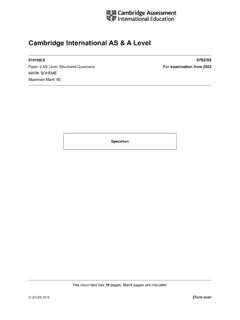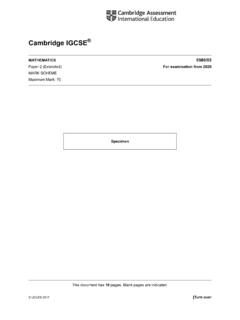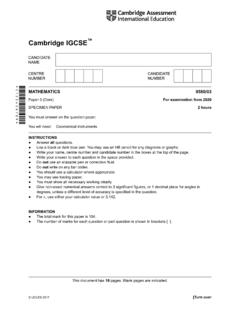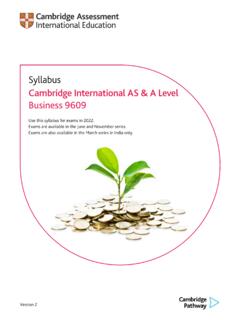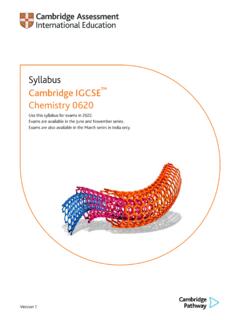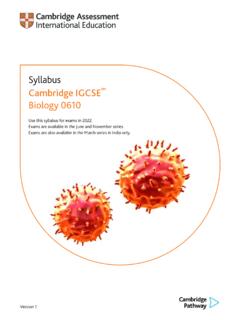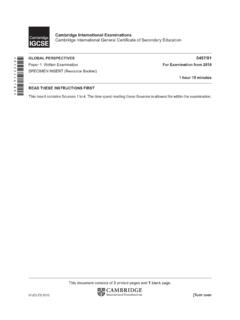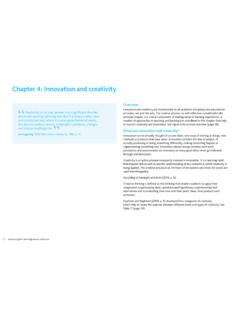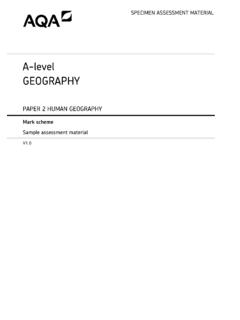Transcription of Syllabus Cambridge IGCSE Geography 0460
1 Version 2 For examination in June and November 2020, 2021 and available for examination in March 2020, 2021 and 2022 for India IGCSE Geography 0460 Why choose Cambridge ? Cambridge Assessment International Education prepares school students for life, helping them develop an informed curiosity and a lasting passion for learning. We are part of the University of international qualifications are recognised by the world s best universities and employers, giving students a wide range of options in their education and career. As a not-for-profit organisation, we devote our resources to delivering high-quality educational programmes that can unlock learners programmes and qualifications set the global standard for international education. They are created by subject experts, rooted in academic rigour and reflect the latest educational research. They provide a strong platform for learners to progress from one stage to the next, and are well supported by teaching and learning mission is to provide educational benefit through provision of international programmes and qualifications for school education and to be the world leader in this field.
2 Together with schools, we develop Cambridge learners who are confident, responsible, reflective, innovative and engaged equipped for success in the modern year, nearly a million Cambridge students from 10 000 schools in 160 countries prepare for their future with an international education from Cambridge International. We think the Cambridge curriculum is superb preparation for university. Christoph Guttentag, Dean of Undergraduate Admissions, Duke University, USAQ uality managementOur systems for managing the provision of international qualifications and education programmes for students aged 5 to 19 are certified as meeting the internationally recognised standard for quality management, ISO 9001:2008. Learn more at Assessment International Education is part of the Cambridge Assessment Group. Cambridge Assessment is the brand name of the University of Cambridge Local Examinations Syndicate (UCLES), which itself is a department of the University of Cambridge .
3 UCLES retains the copyright on all its publications. Registered centres are permitted to copy material from this booklet for their own internal use. However, we cannot give permission to centres to photocopy any material that is acknowledged to a third party even for internal use within a Why choose this Syllabus ? ..22 Syllabus overview ..5 Aims 5 Content overview 5 Assessment overview 6 Assessment objectives 73 Subject content ..9 Resources 9 Case studies 9 Theme 1: Population and settlement 10 Theme 2: The natural environment 13 Theme 3: Economic development 16 Using mathematical skills in Geography 184 Details of the assessment ..19 paper 1 Geographical Themes 19 paper 2 Geographical Skills 20 Component 3 Coursework 23 paper 4 Alternative to Coursework 29 Coursework assessment 32 Coursework guidance notes 34 Command words 355 What else you need to know.
4 36 Before you start 36 Making entries 37 After the exam 38 How students and teachers can use the grades 38 Grade descriptions 38 Changes to this Syllabus for 2020, 2021 and 2022 39 Changes to this syllabusFor information about changes to this Syllabus for 2020, 2021 and 2022, go to page latest Syllabus is version 2, published October 2020. There are no significant changes which affect textbooks endorsed to support the Syllabus for examination from 2016 are still suitable for use with this IGCSE Geography 0460 Syllabus for 2020, 2021 and 2022. to contents page1 Why choose this Syllabus ? Key benefitsCambridge IGCSE syllabuses are created especially for international students. For over 25 years, we have worked with schools and teachers worldwide to develop syllabuses that are suitable for different countries, different types of schools and for learners with a wide range of Cambridge IGCSE Geography candidates develop lifelong skills, including: an understanding of the processes which affect physical and human environments an understanding of location on a local, regional and global scale the ability to use and understand geographical data and information an understanding of how communities around the world are affected and constrained by different programmes balance a thorough knowledge and understanding of a subject and help to develop the skills learners need for their next steps in education or employment.
5 Our approach encourages learners to be:Cambridgelearner The strength of Cambridge IGCSE qualifications is internationally recognised and has provided an international pathway for our students to continue their studies around the world. Gary Tan, Head of Schools and CEO, Raffles International Group of Schools, IndonesiaCambridge IGCSE Geography 0460 Syllabus for 2020, 2021 and 2022. Why choose this Syllabus ? to contents pageRecognition and progressionThe combination of knowledge and skills in Cambridge IGCSE Geography gives learners a solid foundation for further study. Candidates who achieve grades A* to C are well prepared to follow a wide range of courses including Cambridge International AS & A Level IGCSEs are accepted and valued by leading universities and employers around the world as evidence of academic achievement. Many universities require a combination of Cambridge International AS & A Levels and Cambridge IGCSEs or equivalent to meet their entry NARIC, the national agency in the UK for the recognition and comparison of international qualifications and skills, has carried out an independent benchmarking study of Cambridge IGCSE and found it to be comparable to the standard of GCSE in the UK.
6 This means students can be confident that their Cambridge IGCSE qualifications are accepted as equivalent to UK GCSEs by leading universities more at Cambridge IGCSE is one of the most sought-after and recognised qualifications in the world. It is very popular in Egypt because it provides the perfect preparation for success at advanced level programmes. Mrs Omnia Kassabgy, Managing Director of British School in Egypt BSEC ambridge IGCSE Geography 0460 Syllabus for 2020, 2021 and 2022. Why choose this Syllabus ? to contents pageSupporting teachersWe provide a wide range of practical resources, detailed guidance, and innovative training and professional development so that you can give your learners the best possible preparation for Cambridge preparation resources question papers Mark schemes Example candidate responses to understand what examiners are looking for at key grades Examiner reports to improve future teaching CommunityYou can find useful information, as well as share your ideas and experiences with other teachers.
7 On our social media channels and community out more at Face-to-face workshops around the world Online self-study training Online tutor-led training Cambridge Professional Development QualificationsTeaching resources The School Support Hub Syllabus Scheme of work Learner guide Discussion forum Resource list Endorsed textbooks and digital resourcesSupport for Cambridge IGCSEC ambridge IGCSE Geography 0460 Syllabus for 2020, 2021 and to contents page2 Syllabus overview AimsThe aims describe the purposes of a course based on this Syllabus . The aims are to enable students to: an understanding of location on a local, regional and global scale an awareness of the characteristics, distribution and processes affecting contrasting physical and human environments an understanding of the ways in which people interact with each other and with their environment an awareness of the contrasting opportunities and constraints presented by different environments an appreciation of and concern for the environment an appreciation of the earth including its people, places, landscapes, natural processes and overviewThe Syllabus is divided into three themes:Theme 1: Population and settlement Theme 2: The natural environment Theme 3.
8 Economic themes are designed to develop an understanding of natural and human for Cambridge IGCSE GeographyOur School Support Hub provides Cambridge schools with a secure site for downloading specimen and past question papers, mark schemes, grade thresholds and other curriculum resources specific to this Syllabus . The School Support Hub community offers teachers the opportunity to connect with each other and to ask questions related to the IGCSE Geography 0460 Syllabus for 2020, 2021 and 2022. Syllabus overview to contents pageAssessment overviewAll candidates take three papers. All candidates take paper 1 and paper 2, and either Component 3 or paper candidates take: paper 1 1 hour 45 minutes Geographical Themes 45%75 marks, weighted to 100 marksCandidates answer three questions, each worth 25 marks. Candidates must answer one question from each sectionExternally assessedand: paper 2 1 hour 30 minutes Geographical Skills marksCandidates answer all the questionsExternally assessedand either:or:Component 3 Coursework marksTeachers set one centre-based assignment of up to 2000 wordsCentre-based assessment* paper 4 1 hour 30 minutes Alternative to Coursework marksCandidates answer two compulsory questions, completing a series of written tasksExternally assessed* Centre-based assessments require the written approval of Cambridge International.
9 This will only be given to teachers who satisfy Cambridge International requirements concerning moderation. Cambridge International offers schools in-service training courses which are held in Cambridge and IGCSE Geography 0460 Syllabus for 2020, 2021 and 2022. Syllabus overview to contents pageAssessment objectivesThe assessment objectives (AOs) are:AO1 Knowledge with understanding Candidates should be able to demonstrate knowledge and understanding of: the wide range of processes, including human actions, contributing to the development of(a) physical, economic and social environments and their effects on the landscape(b) spatial patterns and interactions which are important within these environments the relationships between human activity and the environment the importance of scale (whether local, regional or global) the changes which occur through time in places, landscapes and spatial Skills and analysis Candidates should be able to.
10 Interpret and analyse geographical data use and apply geographical knowledge and understanding to maps and in numerical, diagrammatic, pictorial, photographic and graphical form use geographical data to recognise patterns in such data and to deduce relationships select and show understanding of techniques for observing and collecting data select and use techniques for organising and presenting Judgement and decision-making Through their geographical training, candidates should be able to: reason and make judgements and decisions, including evaluation and conclusions, which demonstrate, where appropriate(a) an appreciation of the attitudes, values and beliefs of others in issues which have a geographical dimension(b) an awareness of the contrasting opportunities and constraints of people living in different places and under different physical and human conditions(c) a willingness to review their own attitudes in the light of the views of others and new knowledge acquired make judgements and decisions and recognise how these are made within a geographical context as affected and constrained by(a) the physical and human contexts in which decisions are made(b) the values and perceptions of differing groups or individuals(c) the choices available to decision-makers(d)
